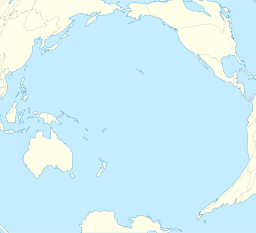| Chevron Reef | |
|---|---|
| Location | |
| Location | Pacific Ocean |
| Coordinates | 33°54′54″N 118°25′57″W / 33.915123°N 118.432624°W |
| Country | United States |
| Geology | |
| Type | artificial reef |
Chevron Reef, also known as Pratte's Reef, was an artificial reef constructed in 2000 in Santa Monica Bay, offshore from Dockweiler State Beach. It was the first artificial surfing reef in the United States and was the second to be built worldwide. [1] It was removed in 2008.
Location
The reef was located about 100 yards offshore in 15 feet of water, north of the El Segundo jetty and 200 yards south of the Hyperion sewage treatment plant 1-mile outfall, known locally as "Shitpipe". [2]
History
In 1984, the California Coastal Commission approved a proposed 900-foot jetty to protect a marine terminal and underwater pipelines at a Chevron facility in El Segundo, California. The Surfrider Foundation fought the decision and an agreement was made that the company would pay $300,000 to build an artificial surfing reef if it could be proved that the jetty caused a substantial decrease in surfable waves. [3]
Research demonstrating the jetty's negative effect on surf quality was completed in 1994, but Chevron paid out the $300,000 only in 1999. Plans proceeded and the reef was dubbed Pratte's Reef in honor of Surfrider co-founder Thomas Pratte, who had been influential in fighting the Chevron jetty approval and died in 1994. In the fall of 2000, 110 geotextile bags were dropped into the water to create the artificial reef. It did not have as much of an effect as hoped and an additional $200,000 grant from the California Coastal Conservancy was secured to fund adding another 90 bags at the site in spring 2001. [4]
In retrospect, the reef was not large enough to focus the swells into nicely breaking waves. [5] Surfrider environmental director Chad Nelsen said in an interview that "when the surf gets big, it breaks outside the reef" but noted that the reef used the greatest volume of sand it could within budget constraints. [6] Beginning in 2008, the reef was removed as required by its permit. [7]
References
- ^ Cohen, Jon (August 1999). "Making Waves". Wired. Retrieved 2007-11-11.
- ^ "Shitpipe". Surfline.com. Archived from the original on March 20, 2011.
- ^ Benning, Jim (February 2001). "Surfing // Wave of the future". Outside. Archived from the original on 2005-11-21. Retrieved 2007-11-11.
- ^ Frost, Garrison (2003-04-13). "The Lessons of Pratte's Reef". The Aesthetic. Retrieved 2007-11-11.
- ^ Peterson, Lee (2005-01-18). "Experts: 'Size matters' in creating a surf reef". Los Angeles Daily Breeze. Archived from the original on September 24, 2005. Retrieved 2007-11-11.
-
^
"Artificial Surf Reefs?". Surfer. Retrieved 2007-11-11.
When the surf gets big, it breaks outside the reef. But we only had a limited amount of money to work on Pratte's, so we built the biggest thing we could, and we built it on the cheap. We got a lot of deals and good will to build that thing, but it's way too small.
- ^ Fontaine, Evan (2008-10-11). "SANDBAGGED After years of unspectacular closeouts, Pratte's Reef is removed from El Segundo". Surfline. Retrieved 2012-03-05.


